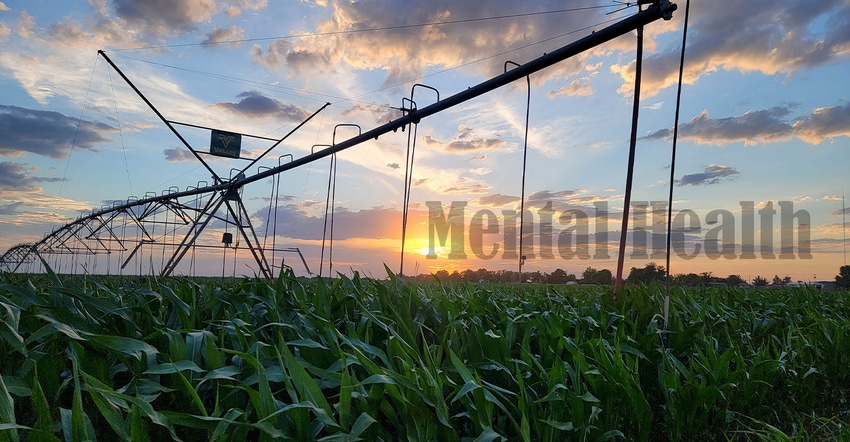
The National Farm Safety Week, recognized earlier this year, helps farmers keep safety in the spotlight and reinforces the need to reduce accidents and mishaps that often end in tragedy for rural families.
Farm safety generally relates to the need for safety with farm equipment, especially on rural roads and highways as farmers move equipment from field to field.
But a darker and perhaps more serious problem in recent years involves the growing concern of emotional and mental stress farm families have been experiencing. Tough financial times associated with low crop prices, higher farm costs, government policy (including recent trade issues), crop insurance changes, financing and loan availability, and natural disasters create unprecedented stress levels.
Combined with a lack of rural mental health infrastructure and the reluctance of farmers to seek assistance even during tough times, agricultural and health officials warn that emotional and mental health issues continue to spike among farm families nationwide.
Dr. Michael R. Rosmann, an Iowa farmer and psychologist whose life’s work involves improving the behavioral healthcare of the agricultural population, says current agriculture stress represents the worst period since the low crop price years and farm crisis years of the 1980s.
“Problems farmers are facing today seem to point to much distress in almost every sector of agriculture because financial problems right now are severe,” Rosmann told Southwest Farm Press in an extended interview last week.
Rosmann, Doctor of Clinical Psychology, has been instrumental in developing a new specialty, agricultural behavioral health. He is the founder of AgriWellness, Inc., a nonprofit, seven-state program that promotes accessible behavioral health services for underserved and at-risk populations affected by the current farm crisis.
A successful and respected author, Rosmann spends much of his time away from his Harlan, Iowa, farm staging workshops and conferences and is often the keynote speaker at major events, including last month’s Farm Aid in Troy, Wisconsin, where he conducted a series of talks about the growing mental problems farmers are facing in today’s business environment.
“Farmers are currently in their fifth year of spending more to put their crops in the ground than they are getting in return for their efforts, causing an incredible amount of stress and mental anguish for many producers,” he warned. “And this year major flooding and loss of crop acres (related to disasters), could mean a devastating year for farmers across many states.”
Rosmann has been working with farmers suffering various forms of mental and emotional issues for more than 40 years and is concerned over the many issues farmers are facing. He notes that the suicide rate for farmers is currently more than double that of U.S. veterans. Some analysts suggest farmer suicide rates may be higher than that because many farmers mask their suicides as farm accidents.
“We may not know until later in the fall whether late-planted crops can even be harvested before the first freeze, and this type of uncertainty is adding more stress to farmers concerned about how much financial stress they can suffer. Many of them fear losing their farms, as so many already have,” he added.
He said while many farmers who are paying the price for the U.S. trade war with once-dependable trading partners have been receiving some supplemental payments from USDA to offset tariffs imposed by China and some European countries, farmers don’t feel that those payments were earned.
“They often feel their loyalty is being purchased and they don’t want to work for the government. They want to produce food and fiber and get paid for their efforts, not to have their political allegiance honored. The uncertainty about that future is adding to their distress,” he observed.
Finding help in the fog of uncertainty
Rosmann said he is telling farmers who are worried about surviving the current farm crisis that some things they simply cannot change, like weather and federal trade policy.
“I tell them we can’t control consumer preferences or control the markets as investors attempt to diversify during times of low crop prices and trade issues,” he said.
But that doesn’t stop them from losing sleep over the issues.
“So, what can farmers control? I tell them we can only control our behaviors or reactions to circumstances beyond our control. The more we understand about managing our own behavior the more likely we are to remain optimally functional as farmers and ranchers to make sound decisions and to be behaviorally healthy as well as physically healthy enough to survive the crisis. That is about the most hopeful thing we can do.”
He says lacking in many rural areas is behavioral health professionals, psychologists and psychiatrists who can offer support during intense times of stress. They must depend on family members or religious counselors or pastors, medical doctors and nurse practitioners, even other farmers to talk to and open up about the emotional and mental issues that stress can cause.
“But traditionally farmers are very independent and often reluctant to share their problems, especially with family members who are also stressed over the same issues. Others are too private to open up to anyone except professionals like primary care physicians, and only then if they think the individual will understand the problems they are dealing with on a daily basis.”
For this reason, he says it is important to understand and observe farmers for signs of advanced stress-related behavior. Such signs might include:
Warning signs of stress or thoughts of suicide.
Withdrawn behavior with periods of less communication.
How they interact with others, including family members.
Do they still laugh heartily from time to time?
Are they sleeping normal hours and getting exercise?
While there is a lack of mental and emotional health infrastructure in rural areas, Rosmann says recent developments offer hope. The 2018 farm bill provided funds to establish limited regional stress management centers around the country to help farmers manage stress. He says more are needed and hopes funding will continue.
“This national network will (eventually) help farmers deal with psychological problems and better cope with the pressures of stress. But the amount of stress we see today is probably going to continue. As far as we know, both threats to agriculture and uncertainty about trade, the markets, and climate shifts will continue to pose challenges to farmers who must make decisions about the future without knowing all the facts,” Rosmann said.
Rosmann sees indications that others are beginning to recognize the dilemma farmers are facing and even farm support groups like the Farm Bureau, many agricultural suppliers and even lenders are recognizing that a crisis exists, and they are trying to find ways to respond.
The best strategy, given current conditions and the lack of resources, is to keep farmers, ranchers and their families well informed about how to deal with stress in agriculture. Being well-read on the subject may be the best way to know how to recognize the signs of stress and how to respond.
“It’s important for agricultural news outlets to keep the topic before them, keep them well informed of the dangers.”
While he says articles like this serve a basic need to help keep farmers and their families informed, new studies are uncovering additional factors that may be at play. To that extent, Dr. Rosmann has agreed to a series of interviews that will help shed more light on ways to recognize and deal with stress and anguish, the causes involved, and ways to respond before it’s too late.
Watch for those reports in the weeks ahead.
About the Author(s)
You May Also Like






